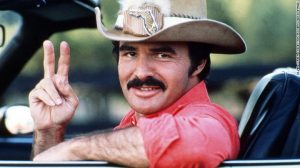Missing in the wave of nostalgia following Burt Reynolds death was his turn as the judge in Mystery, Alaska, the second best hockey movie ever, following Slap Shot.
 It’s become a Christmas Day tradition to watch Trailer Park Boys Christmas, and Mystery, Alaska, starring Australian Russell Crowe who learned to skate at the Big Banana in Coffs Harbour, where the Brisbane Stars host a tournament every year, and my wife has become the fundraising guru.
It’s become a Christmas Day tradition to watch Trailer Park Boys Christmas, and Mystery, Alaska, starring Australian Russell Crowe who learned to skate at the Big Banana in Coffs Harbour, where the Brisbane Stars host a tournament every year, and my wife has become the fundraising guru.
“Smokey and the Bandit” was — and remains — a hell of a lot of fun. It was also a protest movie, both widely popular and unabashedly populist, a word that meant something a little different back then. Cledus and Bandit are southern working-class white men in revolt against, to put it bluntly, state power and capitalist greed.
I’m not saying Burt Reynolds (or Hal Needham, the director of “Smokey,” its sequels and others of its ilk) was a Hollywood Marxist. But more than any other movie star he embodied the stance that permeated much of the country-and-western and southern rock of the Carter era, in which regional pride and defiant hell-raising were accompanied — and sometimes drowned out — by class resentment directed against the bosses and their minions.
